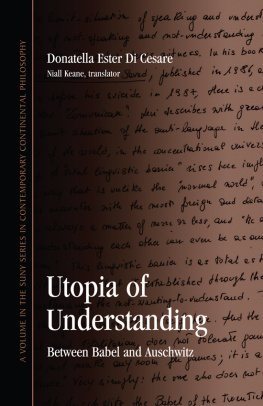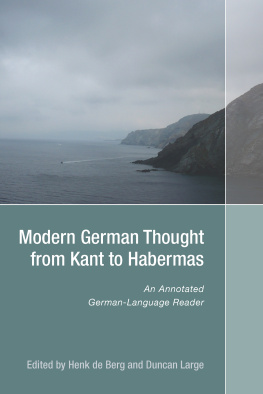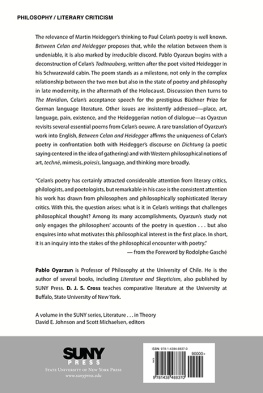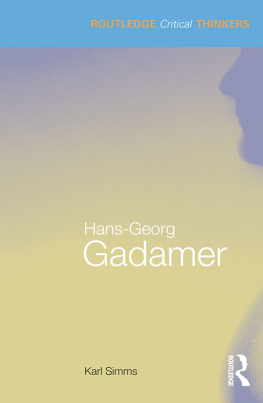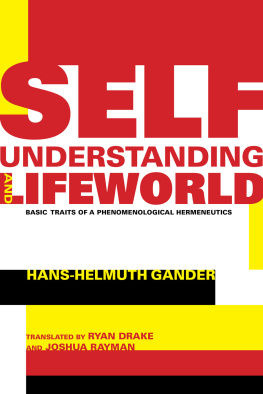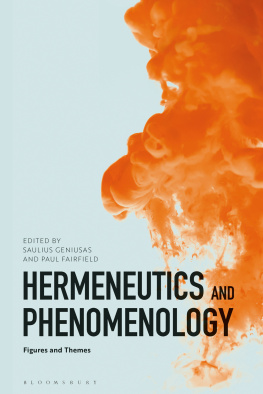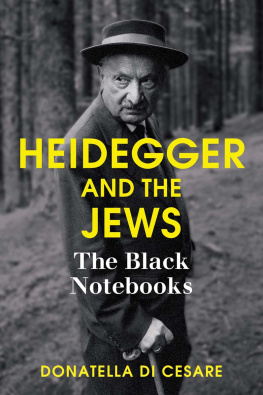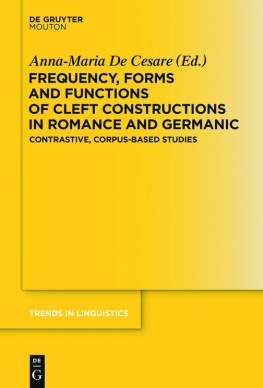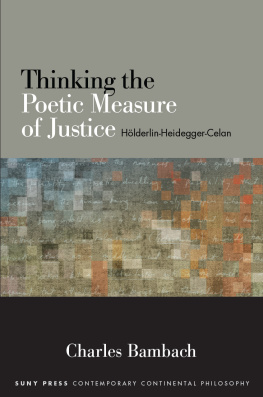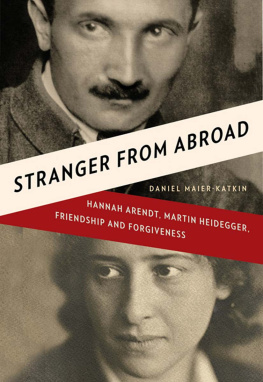Dennis J. Schmidt, editor
UTOPIA OF UNDERSTANDING
Between Babel and Auschwitz
DONATELLA ESTER DI CESARE
TRANSLATED BY
NIALL KEANE
STATE UNIVERSITY OF NEW YORK PRESS
Published by
STATE UNIVERSITY OF NEW YORK PRESS, ALBANY
2012 State University of New York
All rights reserved
Printed in the United States of America
No part of this book may be used or reproduced in any manner whatsoever without written permission. No part of this book may be stored in a retrieval system or transmitted in any form or by any means including electronic, electrostatic, magnetic tape, mechanical, photocopying, recording, or otherwise without the prior permission in writing of the publisher.
For information, contact
State University of New York Press, Albany, NY
www.sunypress.edu
Production, Laurie D. Searl
Marketing, Anne M. Valentine
Library of Congress Cataloging-in-Publication Data
Di Cesare, Donatella.
[Utopia del comprendere. English]
Utopia of understanding : between Babel and Auschwitz / Donatella Ester Di Cesare ; translated by Niall Keane.
p. cm. (SUNY series in contemporary Continental philosophy)
Includes bibliographical references and index.
ISBN 978-1-4384-4253-2 (hardcover : alk. paper)
1. Hermeneutics. 2. Language and languagesPhilosophy. I. Title.
BD241.D425313 2012
121'.686dc23
2011030211
10 9 8 7 6 5 4 3 2 1
In memory of Caterina Serafino
PREFACE

Every philosophy book, no less than a novel, no more than a poem, is autobiographical. It has to do with the biography of the one who writes it, although it is difficult to say how in each individual case. Therefore, it is difficult even in this case. I could not say when I began writing it, or for how long I have been writing it, and only with difficulty can I write the date of its end.
After many interruptions, and as many resumptions, this book was born from a lecture given in Heidelberg at a conference organized by German and American colleagues. I was not sure of its title, and even less of its thesis: Exiled in the Mother Tongue. Later, after some reflection, I was convinced both of the thesis and of the title, but also of the need to write a much larger text. Thus, the fourth chapter of this book was born. But in the meantime, other ideas, simply collateral and parallel, or already intertwined and connected, had begun to emerge, and other theses had sedimented. In particular, I had the opportunity to return again and again to the question of understanding, which opens up between hermeneutics and deconstruction, and to revisit the text of the lecture held on this theme at the Forum fr Philosophie in Bad Homburg, the proceedings of which were published by Suhrkamp in 2000. The initial thesis, rearticulated in light of the later events, forms the content of .
In every way, I consider this to be a book about the philosophy of language, a continuation of what I have been writing since the beginning. But it would be vain, although actually not unusual, to repeat the same things. Once repeated, they already become different. I have never believed in coherence. Curiosity, a well-known feminine flaw, has forced me, in my exile, to search for new stars and new constellations. Hence, although I am the same, I am also different, perhaps even very different than I was at first. I have learned to be so thanks to hermeneutics. And it goes without saying that this book has developed through an uninterrupted dialogue with Hans-Georg Gadamer, uninterrupted even after the interruption of his death. It is difficult to say what I owe him, because it is too much. Perhaps in a word: philosophy. Just as there is no method, so in hermeneutics there is no correct dxa, no orthodoxy to defend. Hence, I assume full responsibility for what I say and the positions I take. First of all, for my openness to deconstruction, to which I do not want to hide my debta word that would not have pleased Derrida. Furthermore, I certainly would not have written these pages without the constant point of orientation, that is, without the orient, of the Jewish tradition, which is perhaps the text's guiding thread, almost to the point of obsession.
In this book, different philosophers appear who have reflected and written on language, speaking, and understanding: Plato, Aristotle, Hamann, von Humboldt, Schleiermacher, Hegel, Nietzsche, Buber, Rosenzweig, Benjamin, Jaspers, Merleau-Ponty, Wittgenstein, Heidegger, Gadamer, and Derrida. But the whole book moves, so to speak, toward a poet, Paul Celan, to whom the seventh, and final, chapter is dedicated. I did not dwell on interpreting Celan, and moreover, I did not want to interpret Celan. If I have, one should treat it as an accident along the way, essential to every way. And much less did I seek out a new language for philosophy in Celan's workan undertaking that would be doomed to failure from the very beginning. Through many readings, and on different occasions, I have realized that his poetry is a setting to work of a reflection on poetry and of a reflection on language where it would be impossible to separate, or even to distinguish, between the setting to work and the reflection. Yet what matters most is that, with his reflections, Celan situates himself within contemporary philosophy of language, not only thanks to the themes he confronts, but also thanks to the anti-metaphysical or a-metaphysical way that he confronts them. Speaking of the affinities with Wittgenstein of the Philosophical Investigations, or even more legitimately, with Heidegger of On the Way to Language is almost obvious. Yet there is something more, a surplus, an excess, and also a beyond, which is his distinctive and chosen trait. Celan thinks of language starting from Auschwitz, after Auschwitz.
One might ask: What does this have to do with Auschwitz? One could easily respond to this question with another question: How can one continue to philosophize calmly about language after Auschwitz? How can one continue to philosophize after the anti-world of the world and after the anti-language of language? How can one continue to philosophize as if nothing had happened? If anything, it is starting from what happened, from that limit situation, where the limit of the human condition became the center of the inhuman condition, and the exception became the rule, that philosophy must rethink language, must reflect yet again, once again, and more responsibly, on speaking and understanding. And it is precisely understanding that, starting from Auschwitz, after Auschwitz, demands to be understood anew. In this sense, I hope this book is a political one, not only because it speaks of utopia, or of the atopical and heteropical utopias, that is, of the tomorrows of the future, of the coming of the other, of the messianic promise to come, but because the question of language is an eminently political question.
I thank Jacques Derrida for having given me the permission to cite what was at that time a still unpublished essay, Bliers. Le dialogue ininterrompu entre deux infinis, le pome, Galile, Paris 2003.
This book is dedicated to my maternal grandmother, Caterina Serafino, who has given me a great past and who believed in the utopias of the future.
Heidelberg, September 2003
ONE
BEING AND LANGUAGE IN PHILOSOPHICAL HERMENEUTICS


